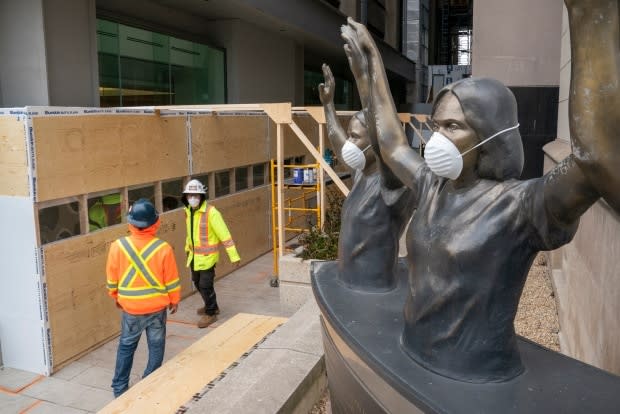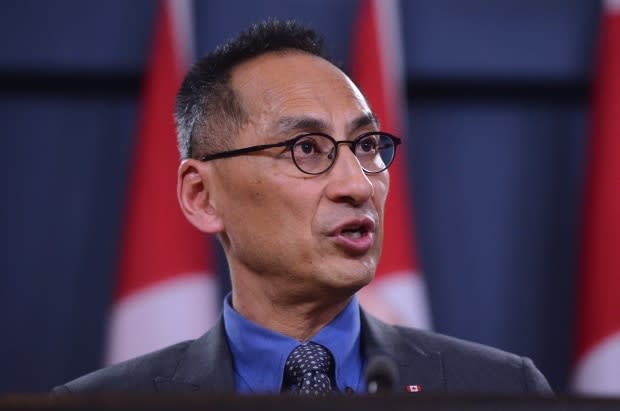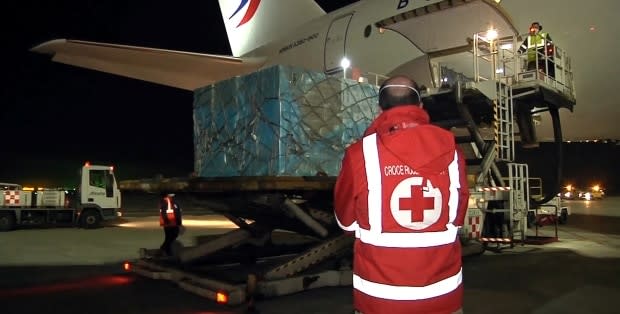Company set to crank out ventilators, awaiting final go-ahead from Ottawa
A Canadian company says it can ramp up production within days of potential life-saving ventilators, once it gets final instructions from the federal government.
Countries are scrambling to avoid the nightmarish scenario unfolding in Italy, where doctors are grappling with which patients to save because there aren't enough breathing machines to serve all the critically ill victims gasping for air.
The Toronto-based medical supplies company has a letter of intent from the federal government to purchase machines and says it can drastically scale up production once it receives one critical detail:
How many machines does the government want?
Thornhill Medical says its production plans hinge on the answer to that question — such as what kind of manufacturing partner might be required, and how financing might work.

Once that's settled, production can immediately start, said company president Lesley Gouldie.
"We would be manufacturing this weekend if we knew what the order was," said Gouldie, whose company's MOVES SLC machine is like a portable intensive-care unit with a ventilator.
"We can't initiate scaling until we know what we have to scale to."
'We'll do whatever it takes'
Those details should be released imminently, one federal official said. The federal government has been consulting with the provinces in assessing requirements.
Depending on the size of the order, Gouldie said the company can either retain the property rights and sub-contract production to a manufacturer, or transfer the technology in exchange for payments or royalties.
One thing she's adamant about is the company can meet the demand.
"We'll do whatever it takes to rapidly scale up," she said. "Manufacturing capability is not going to be the limiting factor."
What's not clear, yet, is how many of these machines actually Canada needs. One study says Ontario risks running out within weeks.
The federal government estimates there are about 5,000 ventilators in the country; that's the figure put forward at a news conference Saturday by Canada's deputy chief public health officer, Dr. Howard Njoo.

He said that depending on the trajectory of the virus Canada might need anywhere from "1,000, to 3,000, or 5,000."
For the sake of comparison, in one of the hardest-hit countries so far, on Saturday Italy had 2,857 patients reported in intensive care for COVID-19.
'This is a war. Treat it like a war'
Closer to home, panic is mounting. In New York State, the governor says his state needs 30,000 ventilators and only has 5,000 to 6,000.
The U.S. Army is discussing plans to turn New York City's empty hotels into intensive-care facilities as cases skyrocket.
"This is a war. Treat it like a war," New York Gov. Andrew Cuomo told CNN, urging the U.S. government to use wartime measures under the Defense Production Act.
"Say to the manufacturers in this country, 'I need you to build these pieces of equipment quickly.' … This is going to be the matter of life and death for people."
It's happened before.
During the Second World War, car companies stopped building cars.
Instead, they churned out planes, engines, and cannons. Ford had plants in five U.S. states producing military supplies; Chrysler alone had two-dozen factories building everything from tanks and plane engines to anti-aircraft cannons.
In Canada, factories that usually made bicycles and hockey skates churned out gun parts; a soda-fountain company made tank parts.
Amid the current crisis, auto companies in different countries, from Ferrari, to Ford, to Canadian parts makers, are discussing possible roles in producing medical supplies.

Flavio Volpe, head of Canada's Automotive Parts Manufacturers' Association, said he was inundated with calls last week from members keen on getting involved.
He said 16 companies expressed interest early in the week, when auto-production lines were still running; by the end of the week, with most production shuttered by the pandemic, he said he got 50 more inquiries in a single day.
"I wish we could take every call — I can't," said Volpe, who said he first discussed the idea in a conversation last weekend with officials in the Ontario and federal governments.
He said that if auto companies get the engineering specifications for a product, and a list of suppliers, they could, within weeks, be churning out gear on a scale unimaginable for medical-supply companies.
"[The medical industry's] scale is less than one per cent of our scale," he said, suggesting that companies could, within weeks, be supplying anything from ventilators to protective gear for doctors, such as masks.
Ottawa company ready to make test kits
The ventilator company, Thornhill, said it's open to new partnerships: "We're an innovative company. … We're more than happy to explore innovative solutions," Gouldie said.
It's currently in talks with a manufacturer from another industry — not a car company, but one that has experience producing medical supplies.
She said any manufacturer would need to demonstrate an ability to comply with the strict regulatory requirements of her industry and be up to the ISO 13485 standard that applies to medical devices.

Her company isn't the only one awaiting a purchase order from the federal government any day now.
A company identified by the federal government as a potential maker of COVID-19 test kits says it hopes to get production rolling within several weeks.
Paul Lem, the founder of Spartan Bioscience in Ottawa, said it would take one week to produce an experimental version and another week to get the results validated. The company could start mass-production after approval from Health Canada, he said.
His company makes machines the size of a coffee cup that take in single-use cartridges for DNA tests.
He said it can be used to test for COVID-19 but needs two things: financing to scale up and instructions from government.
"[Tell us] how many do you need," Lem said.
"Then we can get going."


